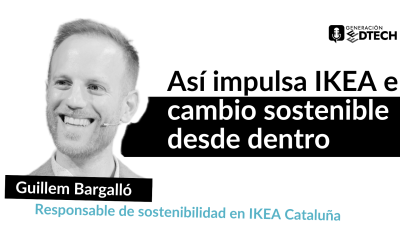Examples can be given at many levels.
In the field of training, which is what we know best and what we work on every day, we try to personalize the student’s experience.
One of the tasks in which AI could be very useful is in adapting educational content to the capabilities of each person.
Not all people have the same capabilities.
So, if you adapt the content to each learner’s ability, they will probably learn better.
I am not only talking about physical disabilities, but also psychological disabilities.
AI, with text generation, could be able to summarize or simplify language, tasks that are very useful.
In the Spanish Society of Natural Language Processing, for example, they launch competitions every year where several of these tasks are addressed.
There are other applications, such as the anonymization of clinical documents.
First, it is necessary to anonymize the data in order to analyze them and find patterns.
There are many ways in which AI can be incredibly useful to society, even if they are sometimes not visible.
The key is to provide people with just what they need to achieve their goals, using the tools available.
Where once we only had computers and basic statistics, we now have tools that have proven to be useful.
Although they are still limited and we don’t know how far they will go, they are growing exponentially.
To keep up to date, you have to study constantly.
We are making a statement of intent, two women driving the development of Artificial Intelligence in a sector that has historically been male.
Hopefully, five years from now, I won’t have to ask this question, but today, unfortunately, I have to ask it: Do you feel that there is still a gap in the sector and that, because you are women, you have certain problems or added difficulties?
Well, obviously not within EducaTech, because here we are.
But it is true that we are surrounded by many colleagues who are men, and that is a reality.
Even so, I think that, as a society, we are advancing and evolving, although perhaps not as fast as technology.
We must be aware that we have a great responsibility and a great job to do in this regard.
Little by little, we are improving, and there are more and more women and girls with motivation and desire to study careers such as data science.
I feel that the gap that existed before is not so big anymore.
We’re not going to deny that it exists, but in my personal situation, I haven’t had that problem.
I’ve been lucky, and that’s the difference.
The gap starts when you are a child.
The problem arises from childhood, because, in the end, when you are an adult, a company doesn’t care if you are a man or a woman; what matters is what you do and what you know.
However, in childhood there is a notable difference.
Traditional roles at an early age are difficult to eradicate.
Although there is a lot of work to be done, there are many initiatives underway to promote the work of women in data science, especially to get girls and young women into the field.
At EducaTech, for example, we have a person in another department who is involved in one of these initiatives.
Many things are being done.
The question is to educate from an early age, but not only the child, but also society.
Most of the gaps come from home, not from outside.
The good thing is that AI doesn’t understand gender; the important thing is where it goes and what you want to do with it.
I love it.
Well, one last question I can’t resist asking.
Speaking of Artificial Intelligence and its exponential growth, two years ago almost nobody knew what ChatGPT was, only in very small circles.
Today, everyone has used it or uses other content generation tools.
Where are we going or where will we be in five years?
Five years is a long time in technology.
Five years ago, in natural language processing, we had a lot less than we have now.
I talk about natural language processing because that’s where ChatGPT is, but there are many more areas of research.
Honestly, I don’t know where we’ll get to.
I don’t have, I wish I did, that key that solves all the unknowns, but we do know how it is evolving.
Progress is being made both in terms of computational requirements to train these models and in the knowledge and use of tools.
There are people with a lot of capacity and inventiveness to take advantage of these tools, and I think that if it is already integrated into society, it will be even more so.
Right now, I think it is very integrated, but we are not fully aware of it because we see it more as systems.
What used to be statistical systems, I think in five years we will be much more aware of their scope.
Great.
Well, Alicia and Manuela, thank you very much for being here with us.
I think we have given some very interesting insights on what Artificial Intelligence is, not only from a big ideas perspective, but also applied to online education.
Thank you very much, and see you next time.
